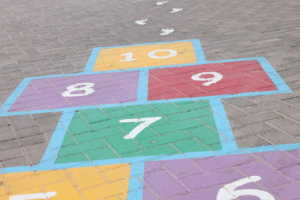Math is not just about numbers but everything we see around us. It is one subject that has been quite challenging for children and adults alike. Fortunately, this subject became simpler since modern methods to learn math for kids merged games and other fun activities with lessons.
When your child learns math using fun activities, they will realize that the subject can be enjoyable. Even the University of Chicago acknowledges that games can assist children in learning math. So, if you are looking to improve your child or student’s aptitude for math, this article will suggest some fun math activities for kids to learn math.
1. Math Bingo
Like bingo on game nights, kids will also have lots of fun playing Math Bingo. Begin by making bingo cards for your kids that include answers to various multiplication tables. After you have distributed cards to the kids, start shouting out numbers. The kids will have to point out the calculation that led to the number you called.
You can also call the equation (10 + 10, 4 x 2, etc.) and have the pupils calculate the outcome through mathematical operations. After that, check to see whether the number is on the card. In summary, Math Bingo is an intriguing variation of the classic game that will catch kids’ attention, so teach your students to play it.
2. Stand up or Sit Down Game
The rules of the Stand Up or Sit Down game are pretty basic. Call out a number before the start of the game, and then read out an equation. Students must rise if the solution to the equation you read aloud equals the number you have chosen in advance. They are to sit if it doesn’t match. Depending on your needs or the kids’ understanding, you can change the standing criteria.
3. Math Baseball 
Math baseball is another enjoyable and engaging activity that helps kids improve their math skills. Its rules are simple. Make sure you splityour class into two teams before starting this game by creating a set of math questions for each side. Customarily, throw a coin to determine who gets to bat first at the start of the game.
The pitching team then ‘pitches’ their math problems to the hitting team whenever they are ready. In addition, teams may pick questions based on their difficulty levels and point values. If the hitting team’s response is accurate, they will check off the first base. There will be no additional questions for that kid should they get the answers wrong.
Pitching is a great opportunity for you to challenge your kids with difficult math questions. Moreover, they will be more attentive if there are rewards for the winning team. People often use baseball L-screens to create a game with numbers and math equations. For instance, you can draw lines on the screen to partition it into quadrants and even make smaller boxes that represent bases.
4. Round The Block
To play this kids math game, make a square with the pupils. Assign one of them a ball to count by twos, name shapes, or just some other mathematical problem and see how quickly they can come up with an answer. Before responding, the student hands the ball to the individual sitting next to him in the line of sight. Then, the kid must respond before the ball returns to him. To continue playing this game, the child in possession of the ball must return it to its starting point by sending it in the opposite direction.
5. Hopscotch Math
 When teaching kids, you can include physical exercise into their study time; that way, they get to practice essential addition and subtraction skills while having fun. You will need chalk to draw a hopscotch game that looks like a calculator on the ground. One of the kids should be the first player, stand at a designated spot, and throw a stone. Afterward, the kid should jump on an equation equal to the number that their stone hit.
When teaching kids, you can include physical exercise into their study time; that way, they get to practice essential addition and subtraction skills while having fun. You will need chalk to draw a hopscotch game that looks like a calculator on the ground. One of the kids should be the first player, stand at a designated spot, and throw a stone. Afterward, the kid should jump on an equation equal to the number that their stone hit.
For instance, the kid could throw the stone at number two. After that, the child needs to leap on squares like 3 – 1, 0 + 2, or its equivalent. While landing on odd numbers or zeros, players must use one-footed hops and two-footed hops on even numbers. If a player makes a mistake, such as jumping on an erroneous equation or walking on a line, others can have their turn.
6. The Initials Game
Each student receives a unique sheet containing tasks related to a specific skill or subject in the Initials Game. A student has to answer one question on their peer’s sheet and write their name next to the solution in pencil. While working on their papers, the kids should move around the classroom and solve their peers’ papers.
7. Splash Game
You will need to get ready to be a little drenched when playing the Splash Game, but rest assured of a fun learning experience for your kids. On the playground, draw a large circle with several numbers. Label balloons from numbers 1 to 20, then fill them up.
Afterward, have a kid select a balloon, identify the appropriate number, and set out to create a splash. For instance, the child could pick up a balloon with a label saying “3 + 5 =?”. Then, the kid should solve the equation and burst the balloon with the equation and the number 8.
Conclusion
Many people consider math a challenging subject to understand and even more difficult to teach kids. Fortunately, math games and other engaging activities are here to change the narrative. The games listed in this article can help you make math a fun learning activity. So, earn to play them and gently ease them into your teaching procedure to benefit your students.
About the author

Jessica Kaminski has worked as a teacher, academic coach, and math consultant in public and private schools for more than ten years.Jessica trained teachers to teach and execute Math in Focus, which has been applied effectively in over 55 districts throughout the United States. She holds a master’s degree in mathematics and is a math tutor many parents trusts because of her caring approach to teaching kids.
This post was sponsored by Brighterly.


